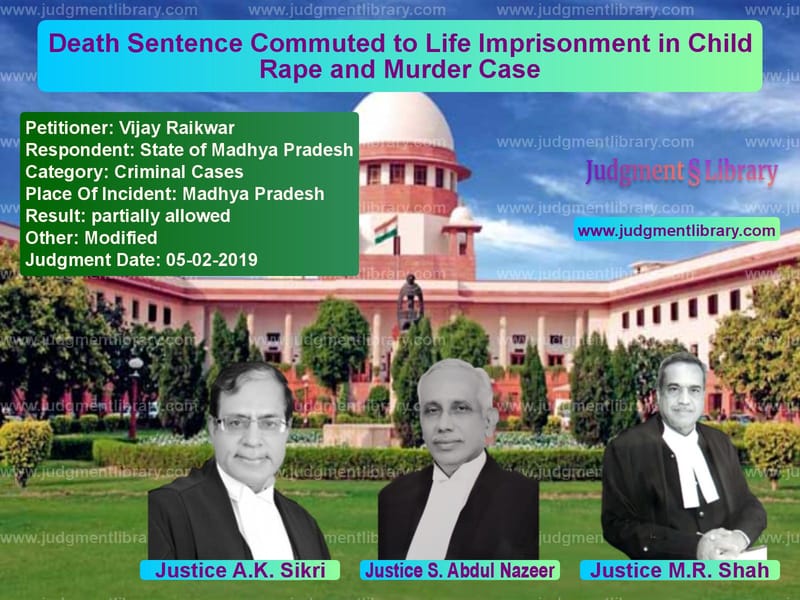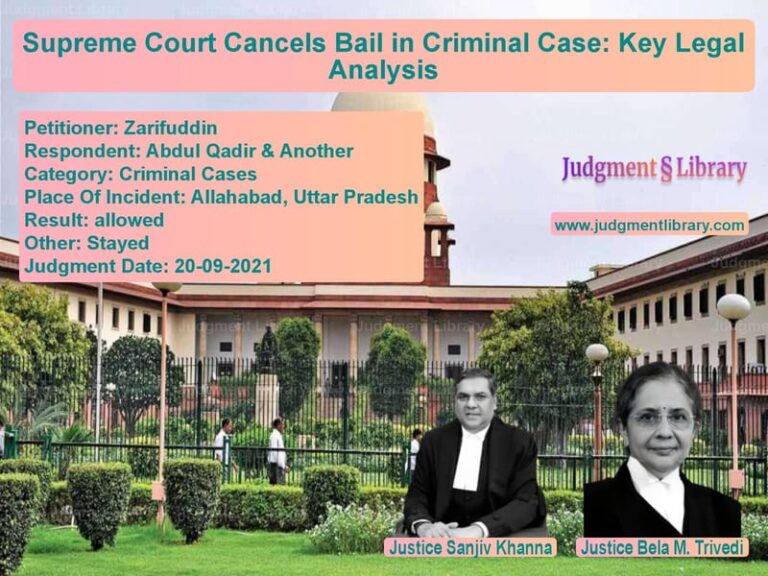Death Sentence Commuted to Life Imprisonment in Child Rape and Murder Case
The Supreme Court of India, in the case of Vijay Raikwar vs. State of Madhya Pradesh, delivered a crucial judgment regarding the sentencing of a convict found guilty of child rape and murder. The case, which involved the brutal crime against a 7½-year-old girl, raised important legal and moral questions about the application of the ‘rarest of rare’ doctrine in capital punishment. While upholding the conviction, the Supreme Court commuted the death sentence to life imprisonment, considering mitigating factors such as the age and reformation potential of the convict.
Background of the Case
The case dates back to 2013, when the accused, Vijay Raikwar, was charged with the rape and murder of a minor girl. The prosecution alleged that the accused, who was last seen with the victim, committed the offense inside his house. The key evidence included:
- The victim’s frock was found on the convict’s cot.
- Blood stains on the mattress and bedsheet matched the victim’s blood group.
- The accused failed to provide a satisfactory explanation for these incriminating pieces of evidence.
Based on this evidence, the Trial Court convicted the accused under:
- Section 376(2)(f) IPC (Rape of a minor).
- Section 201 IPC (Causing disappearance of evidence).
- Sections 5(i), 5(m), and 5(r) read with Section 6 of the POCSO Act, 2012 (Aggravated sexual assault on a minor).
The Trial Court sentenced the accused to death penalty, considering the brutality of the crime and its impact on society.
High Court’s Ruling
The convict appealed before the High Court of Madhya Pradesh at Jabalpur. However, the High Court dismissed the appeal on July 2, 2014, upholding the conviction and confirming the death penalty. The High Court ruled that:
- The circumstantial evidence established the accused’s guilt beyond reasonable doubt.
- The brutality of the crime fell within the ‘rarest of rare’ category, warranting capital punishment.
- The victim was a minor, and the crime involved extreme depravity, making the death penalty appropriate.
Supreme Court’s Analysis and Judgment
The accused further appealed before the Supreme Court of India, challenging both the conviction and the death sentence. The defense argued that:
- The case was based on circumstantial evidence and lacked direct eyewitness testimony.
- The convict was 19 years old at the time of the crime and had no prior criminal record.
- The prosecution failed to prove the guilt beyond a reasonable doubt.
- The death penalty was excessive and should be commuted to life imprisonment.
The Supreme Court upheld the conviction, ruling:
“The prosecution has been successful in proving that the accused was last seen together with the victim; that he gave one rupee coin to the victim; that her dead body was found near his house with blood stains matching her blood group inside the accused’s house.”
However, regarding the death sentence, the Court referred to its precedents in Bachan Singh vs. State of Punjab (1980) and Shyam Singh alias Bhima vs. State of Madhya Pradesh (2017), emphasizing that capital punishment should be awarded only in cases where alternative punishments are unquestionably foreclosed.
Reasons for Commuting the Death Sentence
- The accused was only 19 years old at the time of the offense.
- There was no evidence of him being a hardened criminal or a repeat offender.
- His jail conduct was reported to be good.
- Considering these factors, the case did not fall within the ‘rarest of rare’ category justifying the death penalty.
The Supreme Court held:
“Though we acknowledge the gravity of the offense, we are unable to satisfy ourselves that this case warrants the death penalty. The accused was not a previous convict or a professional killer.”
Final Judgment
- The Supreme Court dismissed the appeal challenging the conviction.
- The conviction under Sections 376(2)(f), 201 IPC, and Sections 5(i), 5(m), and 5(r) read with Section 6 of the POCSO Act was upheld.
- The death sentence was commuted to life imprisonment.
Impact and Significance of the Judgment
- Limited Scope of Death Penalty: The ruling reinforces that capital punishment must be reserved for cases where alternative punishments are inadequate.
- Consideration of Age and Reform Potential: The decision highlights that young offenders, particularly first-time offenders, should be given a chance at reformation.
- Judicial Approach to Circumstantial Evidence: The case reaffirms that strong circumstantial evidence can lead to conviction but must be weighed carefully in sentencing.
Conclusion
The Supreme Court’s ruling in Vijay Raikwar vs. State of Madhya Pradesh balances justice with the possibility of reform. While upholding the conviction, the judgment provides a nuanced approach to capital punishment, ensuring that the death penalty is applied only in the rarest of rare cases. This ruling sets a significant precedent for similar cases involving circumstantial evidence and sentencing under the POCSO Act.
Petitioner Name: Vijay Raikwar.Respondent Name: State of Madhya Pradesh.Judgment By: Justice A.K. Sikri, Justice S. Abdul Nazeer, Justice M.R. Shah.Place Of Incident: Madhya Pradesh.Judgment Date: 05-02-2019.
Don’t miss out on the full details! Download the complete judgment in PDF format below and gain valuable insights instantly!
Download Judgment: Vijay Raikwar vs State of Madhya Prad Supreme Court of India Judgment Dated 05-02-2019.pdf
Direct Downlaod Judgment: Direct downlaod this Judgment
See all petitions in Murder Cases
See all petitions in SC/ST Act Case
See all petitions in Judgment by A.K. Sikri
See all petitions in Judgment by S. Abdul Nazeer
See all petitions in Judgment by Mukeshkumar Rasikbhai Shah
See all petitions in partially allowed
See all petitions in Modified
See all petitions in supreme court of India judgments February 2019
See all petitions in 2019 judgments
See all posts in Criminal Cases Category
See all allowed petitions in Criminal Cases Category
See all Dismissed petitions in Criminal Cases Category
See all partially allowed petitions in Criminal Cases Category







